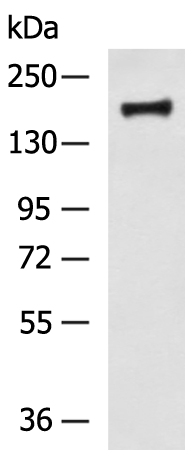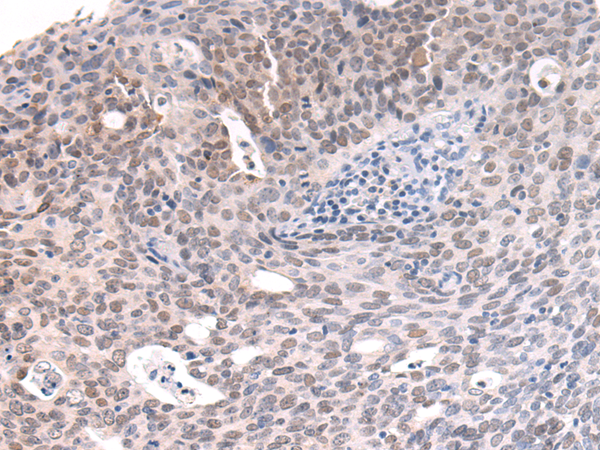

| WB | 1/500-1/2000 | Human,Mouse,Rat |
| IF | 咨询技术 | Human,Mouse,Rat |
| IHC | 1/100-1/300 | Human,Mouse,Rat |
| ICC | 技术咨询 | Human,Mouse,Rat |
| FCM | 咨询技术 | Human,Mouse,Rat |
| Elisa | 1/5000-1/10000 | Human,Mouse,Rat |
| Aliases | GTBP; HSAP; p160; GTMBP; HNPCC5 |
| WB Predicted band size | 153 kDa |
| Host/Isotype | Rabbit IgG |
| Antibody Type | Primary antibody |
| Storage | Store at 4°C short term. Aliquot and store at -20°C long term. Avoid freeze/thaw cycles. |
| Species Reactivity | Human, Mouse |
| Immunogen | Fusion protein of human MSH6 |
| Formulation | Purified antibody in PBS with 0.05% sodium azide and 50% glycerol. |
+ +
以下是3篇与MSH6抗体相关的参考文献及其摘要概括:
---
1. **文献名称**: *"Immunohistochemistry versus Microsatellite Instability Testing for Screening Colorectal Cancer Patients at Risk for Hereditary Nonpolyposis Colorectal Cancer"*
**作者**: Shia J et al.
**摘要**: 该研究比较了免疫组化(使用MSH6、MSH2、MLH1和PMS2抗体)与微卫星不稳定性(MSI)检测在林奇综合征筛查中的效果,发现MSH6抗体在识别错配修复缺陷患者中具有高特异性,但需结合其他抗体以提高敏感性。
---
2. **文献名称**: *"Performance of Antibodies in the Detection of Mismatch Repair Proteins in Colorectal Cancer"*
**作者**: van der Klift HM et al.
**摘要**: 研究评估了不同商业抗体(包括MSH6抗体)在结直肠癌组织中的染色效果,发现MSH6抗体的敏感性和特异性受组织固定方法影响显著,建议优化实验条件以减少假阴性结果。
---
3. **文献名称**: *"Mechanisms of MSH6 Loss in Cancer Cells and Its Implications for Therapy"*
**作者**: Hegde MR et al.
**摘要**: 本文探讨了肿瘤细胞中MSH6蛋白缺失的分子机制(如突变和表观遗传沉默),并强调MSH6抗体在评估DNA修复功能及指导靶向治疗(如PARP抑制剂)中的应用价值。
---
如需具体文献链接或更多研究,可进一步提供关键词或研究方向。
The MSH6 antibody is a critical tool in molecular pathology and cancer research, primarily used to assess the expression of the MSH6 protein, a component of the DNA mismatch repair (MMR) system. MSH6. encoded by the *MSH6* gene, partners with MSH2 to form the MutSα complex, which detects base-pair mismatches and small insertion-deletion loops during DNA replication. Deficiencies in MSH6 disrupt MMR, leading to microsatellite instability (MSI), a hallmark of Lynch syndrome and certain sporadic cancers, including colorectal, endometrial, and gastric cancers.
Immunohistochemistry (IHC) using MSH6 antibodies helps identify tumors with MMR deficiency by detecting loss of nuclear MSH6 protein expression. This aids in diagnosing Lynch syndrome, guiding genetic testing, and informing treatment decisions, as MSI-high tumors may respond differently to therapies like immunotherapy. However, interpretation requires caution, as MSH6 loss can occur secondary to mutations in *MSH6* or its partner *MSH2*, and technical factors may cause false negatives. Research also explores MSH6's role in predicting prognosis and therapeutic responses. Despite challenges, MSH6 antibodies remain essential for understanding MMR pathways and advancing precision oncology.
×